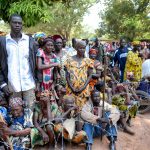Our project studies the role of the public sector and the opportunities it can provide for women’s employment and the gender pay gap in low-income countries (LICs). Using the preliminary evidence from microdata for a number of SSA countries, we show that the public sector in poor economies behaves very differently from private firms: it…
Women’s Employment and Family Decisions in Sub-Saharan Africa
Labor Markets in Southern Africa: Evidence and Policy Lessons
The Labour Market Impacts of Forced Migration
Millions of people around the world have been forced to abandon their homes due to conflict, as either international refugees or internally displaced persons. Forced migration produces significant economic impacts. These impacts involve multiple factors, but one key element of these impacts is labour markets. Labour markets have important implications for long-term development after an…
Labour Markets and Household Enterprises
It is a general tenet of economic theory that competitive markets, supported by adequate infrastructure and institutions, do a better job of determining prices and allocating resources than do large-scale government planning programmes. In the structural adjustment era of the 1980s-90s, this belief underpinned a historic shift away from central planning and toward market liberalisation…
Modelling Labour Markets in LICs with Imperfect Data
Despite the centrality of the labour market to the questions of poverty and inequality, African labour markets are not well understood and significant research gaps exist. These gaps have important implications: they weaken the ability of governments to design and implement effective policies and hamper the monitoring of change and the measurement of impact. Within…
Measuring Labour in Farm Households in Africa
In low-income countries, work in household owned and managed farms account for a large share of the labour force. Yet, to date, there is very little research on the approaches to measuring farm labour. Typically most measurements of farm labour involve a cumulative number representing a wide range of activities. For example, male labour is…





